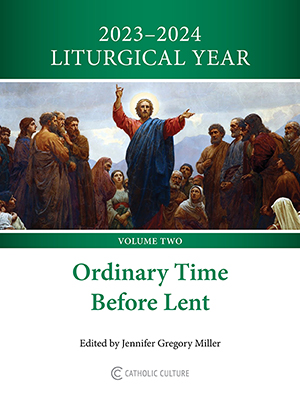Fasting for Joy
By Dr. Jeff Mirus ( bio - articles - email ) | Dec 30, 2011
You don’t have to look for long at Catholic news to know that the peaceful practice of one’s faith is hard to come by. Christians seem to be always suffering, and everywhere. Consider these headlines from just the past two days:
Free eBook:

|
| Free eBook: Liturgical Year 2023-2024, Vol. 2 |
- 26 priests, religious, lay pastoral workers slain in 2011
- Nigerian bishops declare day of prayer and fasting; death toll rises to 200
- USCCB calls for justice for Nigerian terrorists, 2-state solution in Holy Land
- Philippines: suspect arrested in October murder of missionary priest
- Islamic brotherhood asks Egyptian military to protect Coptic Christmas celebration
- The Popes and the World Day of Peace (background)
Granted, physical violence against Christians tends to be confined to certain areas of the world at present, but even in the West, where physical violence is relatively rare, we could string together a list of headlines which show a more-or-less continuous “soft” assault on Christians, pressuring them even by law to violate their consciences, and to effectively deny the Christian doctrines that inform their consciences, especially on sexual, family and life issues. So we have blood martyrs by the thousands, and we have dry martyrs by the millions.
What are we to make of all this?
This is a question Our Lord answered while He walked among us: “A disciple is not above his teacher, nor a servant above his master; it is enough for the disciple to be like his teacher, and the servant like his master. If they have called the master of the house Be-el'zebul, how much more will they malign those of his household” (see Mt 10:16-39).
This is a warning, but apparently Our Lord regards it also as a blessing. In the Sermon on the Mount, he says: “Blessed are those who are persecuted for righteousness' sake, for theirs is the kingdom of heaven. Blessed are you when men revile you and persecute you and utter all kinds of evil against you falsely on my account. Rejoice and be glad, for your reward is great in heaven, for so men persecuted the prophets who were before you” (Mt 5:10-12). In a similar passage in Luke’s gospel, Our Lord actually tells us to “leap for joy” when these things happen (Lk 6:22-23).
In his wonderful account of the Christian King Alfred’s defense of Wessex against the pagan Danes, The Battle of the White Horse, G. K Chesterton puts Our Lord’s answer—His warning and His blessing—in poetic form. Chesterton places Alfred in the Danish camp, disguised as a Wessex minstrel at a pagan feast, and listening to the pagan boasts. At a certain point, the disguised minstrel rises to sing his own song:
“Sirs, I am but a nameless man,
A rhymester without home,
Yet since I come of the Wessex clay
And carry the cross of Rome,
“I will even answer the mighty earl
That asked of Wessex men
Why they be meek and monkish folk,
And bow to the White Lord's broken yoke;
What sign have we save blood and smoke?
Here is my answer then.
“That on you is fallen the shadow,
And not upon the Name;
That though we scatter and though we fly,
And you hang over us like the sky,
You are more tired of victory,
Than we are tired of shame.
“That though you hunt the Christian man
Like a hare on the hill-side,
The hare has still more heart to run
Than you have heart to ride.
“That though all lances split on you,
All swords be heaved in vain,
We have more lust again to lose
Than you to win again.
“Your lord sits high in the saddle,
A broken-hearted king,
But our king Alfred, lost from fame,
Fallen among foes or bonds of shame,
In I know not what mean trade or name,
Has still some song to sing;
“Our monks go robed in rain and snow,
But the heart of flame therein,
But you go clothed in feasts and flames,
When all is ice within;
“Nor shall all iron dooms make dumb
Men wondering ceaselessly,
If it be not better to fast for joy
Than feast for misery.”
Suffering with Christ is a blessing because it incorporates us into Joy Itself.
All comments are moderated. To lighten our editing burden, only current donors are allowed to Sound Off. If you are a current donor, log in to see the comment form; otherwise please support our work, and Sound Off!
-
Posted by: John J Plick -
Jan. 01, 2012 10:31 PM ET USA
Well said, TheJournalist64….; except that I think you understate the matter. Might I suggest some informative reading that gives the extraordinary flavor of early Catholicism in the Roman Empire, “The Golden Legend,” by Jacobus de Voragine. Although apocryphal in nature it is no “fairy tale” but describes in striking detail the intense and sometimes grotesque sacrifices zealously made by the early Saints and martyrs. You could change your font to blood red with an exclamation point.
-
Posted by: TheJournalist64 -
Dec. 30, 2011 1:44 PM ET USA
I first encountered this magnificent epic poem as a senior in high school, and have never forgotten it. When I retired as principal from my last school, I read a similar passage from it to my faculty. At some point we are all to be like the young men in the furnace. Our cry must be, "I don't know whether my God will save me from your flames or not, but this I do know--I WILL NOT BOW DOWN TO YOUR IDOL."








